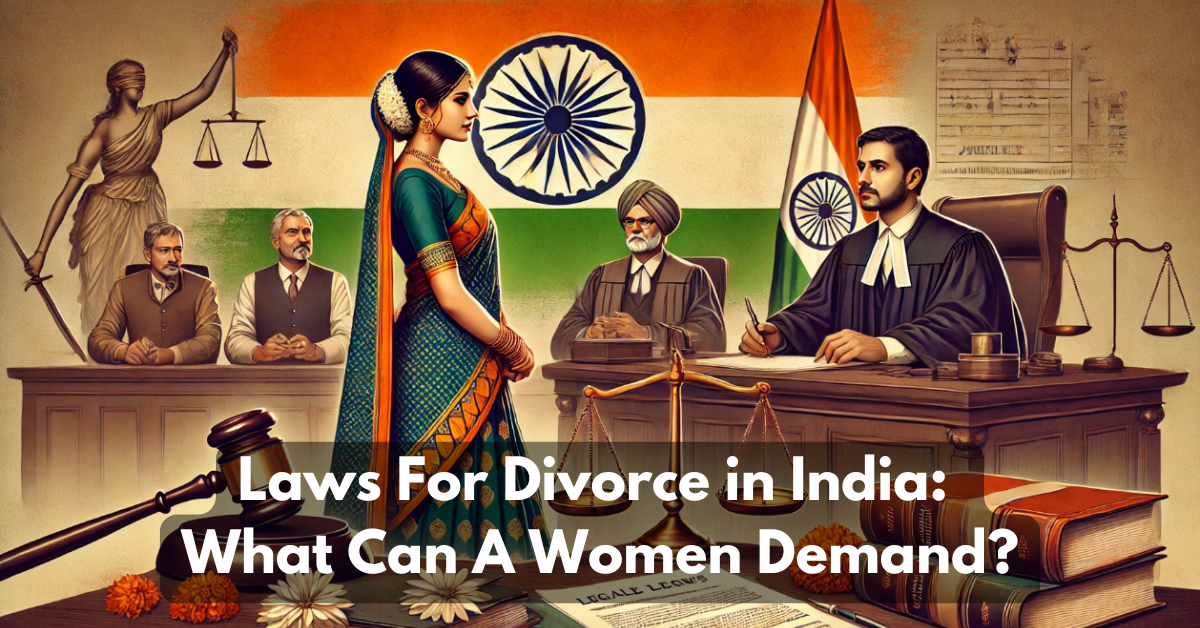
Laws For Divorce in India: What Can A Woman Demand?
Divorce is a significant legal and emotional event that can be both complex and challenging, especially for women who may find themselves in uncertain territory. In India, divorce laws are governed by various personal laws depending on the religion of the individuals involved. Understanding what you can demand and what you are entitled to is crucial for protecting your rights during a divorce. Through this legal article, we wanted to educate on the key areas of laws for divorce in India, such as where women in India can assert their rights, focusing on financial support, property division, and child custody.
Financial Support: Alimony and Maintenance
One of the most critical aspects of divorce for women is securing financial support, commonly known as alimony or maintenance. In India, the laws governing alimony are designed to ensure that a woman is not left in financial distress following the dissolution of her marriage.
Understanding Alimony and Maintenance
Alimony refers to the financial support a spouse provides to the other after a divorce. Under Indian law, alimony is typically granted based on the needs of the wife and the ability of the husband to pay. Maintenance, on the other hand, can be claimed during the divorce process (interim maintenance) or as post-divorce support.
Key Factors in Determining Alimony
- Length of the Marriage: Generally, longer marriages may result in higher or longer alimony payments.
- Financial Status of Both Parties: The court considers the income, assets, and liabilities of both spouses.
- Earning Capacity: If the wife is not financially independent or has a lower earning capacity, the court is likely to grant alimony.
- Standard of Living: The court strives to ensure that the wife maintains a similar standard of living post-divorce as she did during the marriage.
- Contributions to the Marriage: Non-financial contributions, such as homemaking or child-rearing, are also considered when determining alimony.
Types of Alimony in India
- Temporary Alimony: Granted during the divorce proceedings to support the wife until the final settlement.
- Rehabilitative Alimony: Provided for a specific period to allow the wife to gain the necessary skills or education to become self-sufficient.
- Permanent Alimony: Awarded in cases of long marriages or where the wife is unable to support herself due to age, health, or other factors.
Division of Marital Property
The division of marital property is another crucial aspect of divorce in India. Unlike some countries where property is divided equally, Indian law does not automatically grant the wife an equal share of the marital property.
Principles of Property Division
- Separate Property vs. Marital Property: Property owned by either spouse before the marriage is typically considered separate property. Marital property includes assets acquired during the marriage.
- No Community Property Law: India does not follow the community property system, which means there is no automatic 50-50 split of marital property. Instead, the division is based on the contribution of each spouse to the acquisition of the property.
- Court’s Discretion: Courts may order the sale of jointly owned property and the division of proceeds if an equitable settlement cannot be reached. Alternatively, the court may award the property to one spouse while compensating the other with cash or other assets.
Key Considerations in Property Division
- Real Estate: Includes the family home and any other property acquired during the marriage.
- Financial Assets: Bank accounts, investments, retirement funds, and other financial assets accumulated during the marriage.
- Personal Property: Items such as vehicles, jewellery, and other personal possessions.
Child Custody and Support
For women with children, securing child custody and support is often a primary concern during a divorce.
Custody Arrangements
Custody decisions in India are made with the best interests of the child in mind. The mother is often favoured for custody of young children, particularly daughters, but this is not a fixed rule.
Types of Custody
- Physical Custody: Refers to where the child will live after the divorce.
- Legal Custody: Involves the right to make important decisions about the child’s upbringing, including education, health care, and religious instruction.
Factors Influencing Custody Decisions
- Child’s Age: Younger children are often placed in the mother’s custody, especially if the child is under the age of five.
- Emotional Bonds: The relationship between the child and each parent is a crucial factor.
- Living Conditions: The stability and suitability of each parent’s home environment are considered.
Child Support
Child support is intended to cover the costs associated with raising a child, including education, healthcare, and day-to-day living expenses.
Determining Child Support as per the Laws For Divorce in India:
- Income of Both Parents: The court considers the financial capability of both parents.
- Child’s Needs: Specific needs, such as educational and medical expenses, are taken into account.
- State Guidelines: Most states in India have guidelines for calculating the appropriate amount of child support.
Maintenance of Lifestyle and Other Rights
Standard of Living: During divorce proceedings, women may seek to maintain a standard of living similar to what they experienced during the marriage. This consideration can significantly influence alimony and property division outcomes.
Healthcare and Insurance: If the wife was covered under her husband’s health insurance, arrangements for continued coverage or alternative insurance must be negotiated.
Legal Representation and Fair Process
Legal Fees: In cases where there is a significant financial disparity between the spouses, the court may order the husband to cover the wife’s legal fees to ensure equitable representation.
Ensuring Fairness: It is essential for women to ensure that the divorce process is fair and that they have the opportunity to present their case fully. This includes providing evidence, challenging the spouse’s claims, and advocating for a settlement that accurately reflects their contributions and needs.
If you are seeking expert legal guidance for divorce-related matters, don’t go through it alone. Innerwork Advisors LLP, the leading law firm in Kolkata, specializes in divorce-related legal consultation. With a team of experienced professionals dedicated to protecting your rights and securing the best possible outcome, Innerwork Advisors LLP is here to help you every step of the way.
Also Read: How To Legally Respond To A Divorce Paper?






